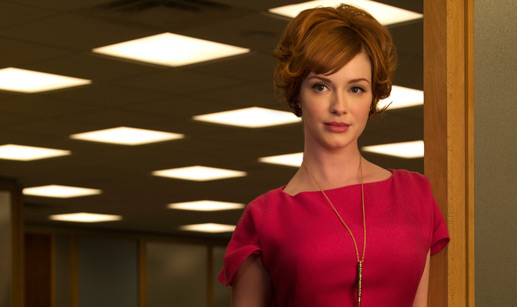 i should begin by writing lofty posts, but instead I’ll go with what’s most on my mind: “Mad Men.” I watched Sunday’s episode last night, and wanted to think about Rod Dreher’s question–Who is your favorite Mad Men character?–with a twist: Which Mad Men character are you? I’d like to say I’m none of them, though I find myself relating a great deal to Colin Hanks’ (subtly performed) character, Father Gill. I get the sense he has a past (“Oh, I’ve lived in the world,” he says to Peggy), but he’s so darn sincere about his faith, and grateful for his priestly role. I look forward to learning about the messier side of Fr. Gill, and also hope that he does the cloth proud–it’d be a real triumph for the “Mad Men” writers to give us a priestly character who is well ordered, and not automatically doomed by virtue of his being a religious figure in fiction.
i should begin by writing lofty posts, but instead I’ll go with what’s most on my mind: “Mad Men.” I watched Sunday’s episode last night, and wanted to think about Rod Dreher’s question–Who is your favorite Mad Men character?–with a twist: Which Mad Men character are you? I’d like to say I’m none of them, though I find myself relating a great deal to Colin Hanks’ (subtly performed) character, Father Gill. I get the sense he has a past (“Oh, I’ve lived in the world,” he says to Peggy), but he’s so darn sincere about his faith, and grateful for his priestly role. I look forward to learning about the messier side of Fr. Gill, and also hope that he does the cloth proud–it’d be a real triumph for the “Mad Men” writers to give us a priestly character who is well ordered, and not automatically doomed by virtue of his being a religious figure in fiction.
But the most fascinating part of last week’s episode was the mini-arc of Joan Holloway. (Spoiler alert.)
She’s been a harlot, a sexpot, and the office bitch. She enjoys the power she wields over both women (as the first among equals among the office secretaries) and men (as a sex symbol), and until now, we’ve not seen her consider herself much outside of those capacities. But this week, she stumbles into a script reading gig, and finds that she has a real knack for it. And she does–we learn, along with her, that she has a gift for understanding how a narrative will draw an audience, and how that understanding can help a business’s bottom line. She succeeds in her new role very quickly…and, because she’s a woman, it’s all for naught. Joan’s power is diminishing–her new man thinks it’s cute that she has interests, but really just wants her to set the table and bring him a glass of water. At work, she’s replaced by a man with zero skills. I suppose this arc is just a documentation of a reality of the American workplace, but I also wonder if we’ll see Joan rise up (that is, if she’ll parallel Betty’s new determination to fight the male power).
The other fascinating thing about this episode is its depiction of the early history of television advertising. Here we are at a big Madison Avenue ad firm, and they can’t get their heads past print. They stumble into television almost by accident, and clearly have no idea that it is the future of their business. It’s also fascinating (and disturbing, but not surprising) that the show suggests that at this early date, television narratives were dictated to a large degree by the whims and concerns of advertisers. This show is so smart on how many of our cultural practices encourage people to be passive, uncritical, receptive—
entertained to death.
 i should begin by writing lofty posts, but instead I’ll go with what’s most on my mind: “Mad Men.” I watched Sunday’s episode last night, and wanted to think about Rod Dreher’s question–Who is your favorite Mad Men character?–with a twist: Which Mad Men character are you? I’d like to say I’m none of them, though I find myself relating a great deal to Colin Hanks’ (subtly performed) character, Father Gill. I get the sense he has a past (“Oh, I’ve lived in the world,” he says to Peggy), but he’s so darn sincere about his faith, and grateful for his priestly role. I look forward to learning about the messier side of Fr. Gill, and also hope that he does the cloth proud–it’d be a real triumph for the “Mad Men” writers to give us a priestly character who is well ordered, and not automatically doomed by virtue of his being a religious figure in fiction.
i should begin by writing lofty posts, but instead I’ll go with what’s most on my mind: “Mad Men.” I watched Sunday’s episode last night, and wanted to think about Rod Dreher’s question–Who is your favorite Mad Men character?–with a twist: Which Mad Men character are you? I’d like to say I’m none of them, though I find myself relating a great deal to Colin Hanks’ (subtly performed) character, Father Gill. I get the sense he has a past (“Oh, I’ve lived in the world,” he says to Peggy), but he’s so darn sincere about his faith, and grateful for his priestly role. I look forward to learning about the messier side of Fr. Gill, and also hope that he does the cloth proud–it’d be a real triumph for the “Mad Men” writers to give us a priestly character who is well ordered, and not automatically doomed by virtue of his being a religious figure in fiction. 
